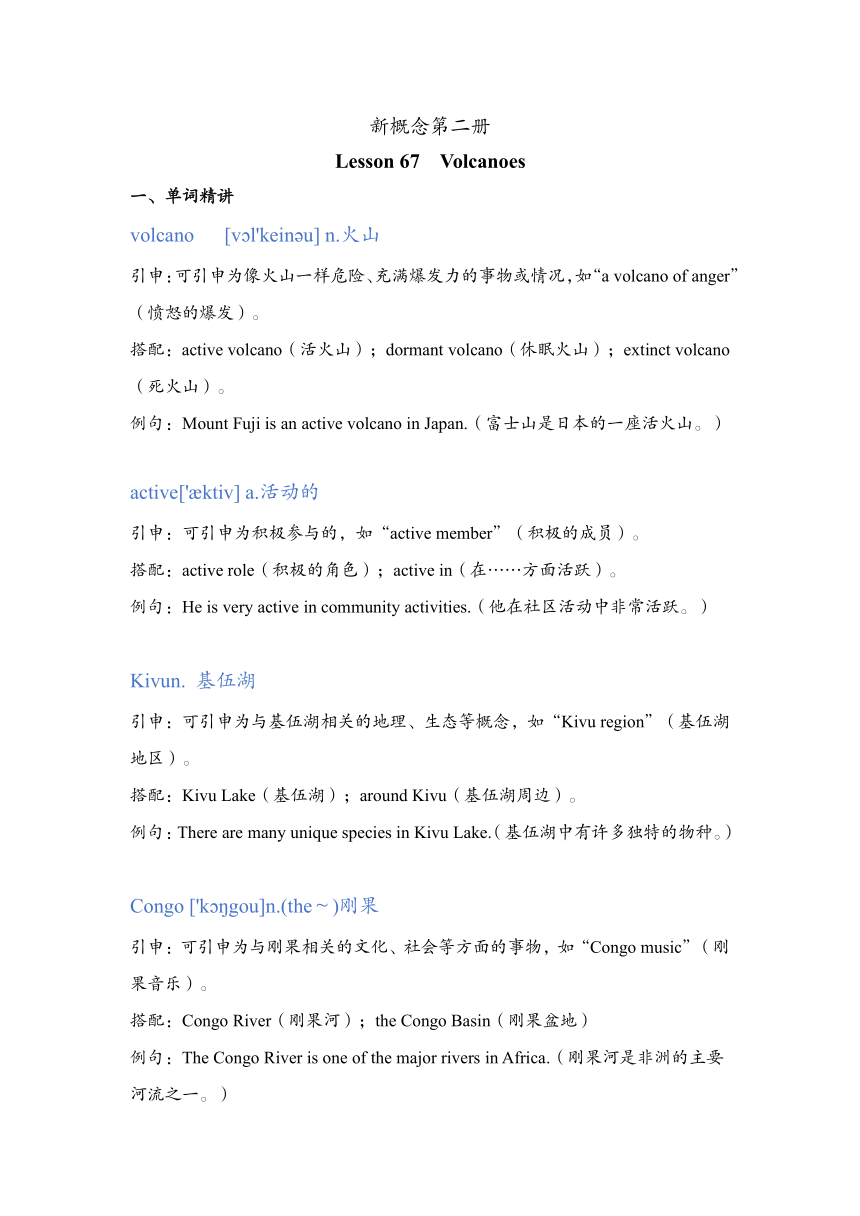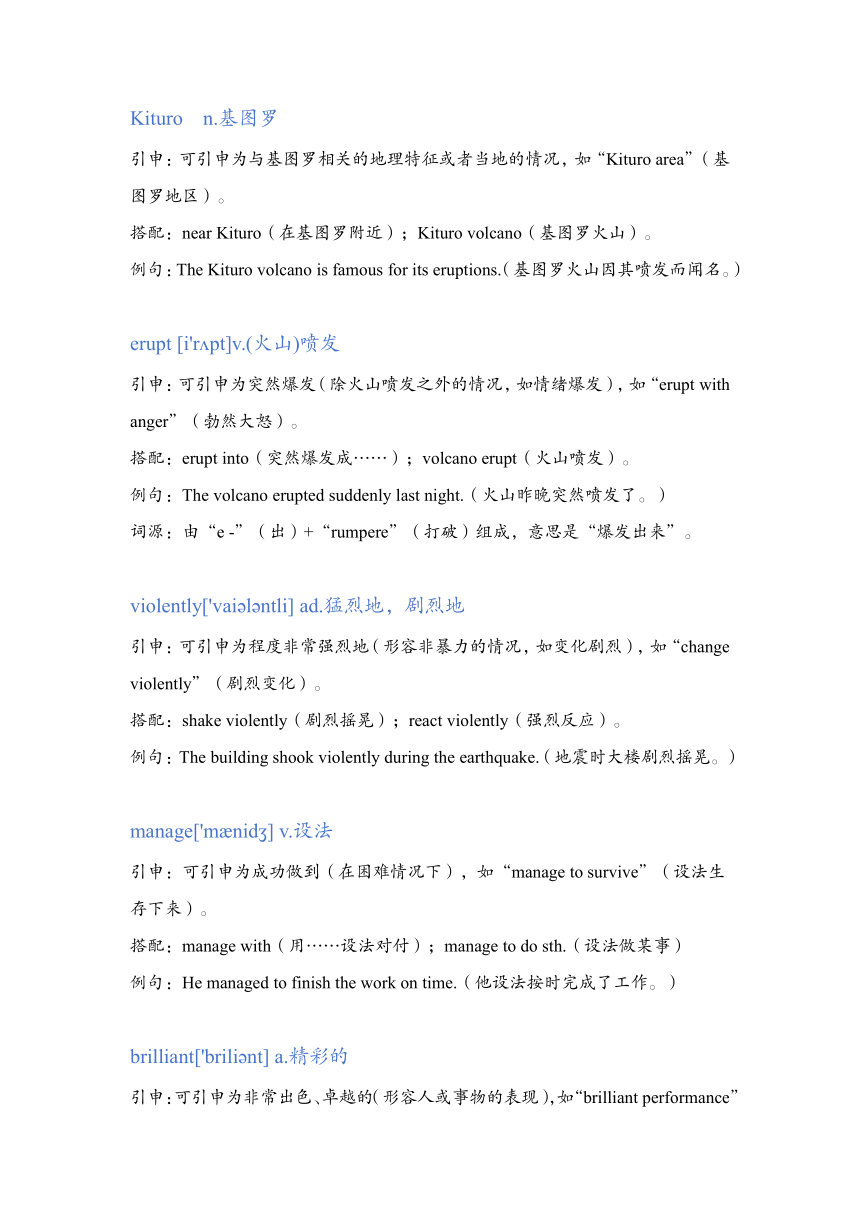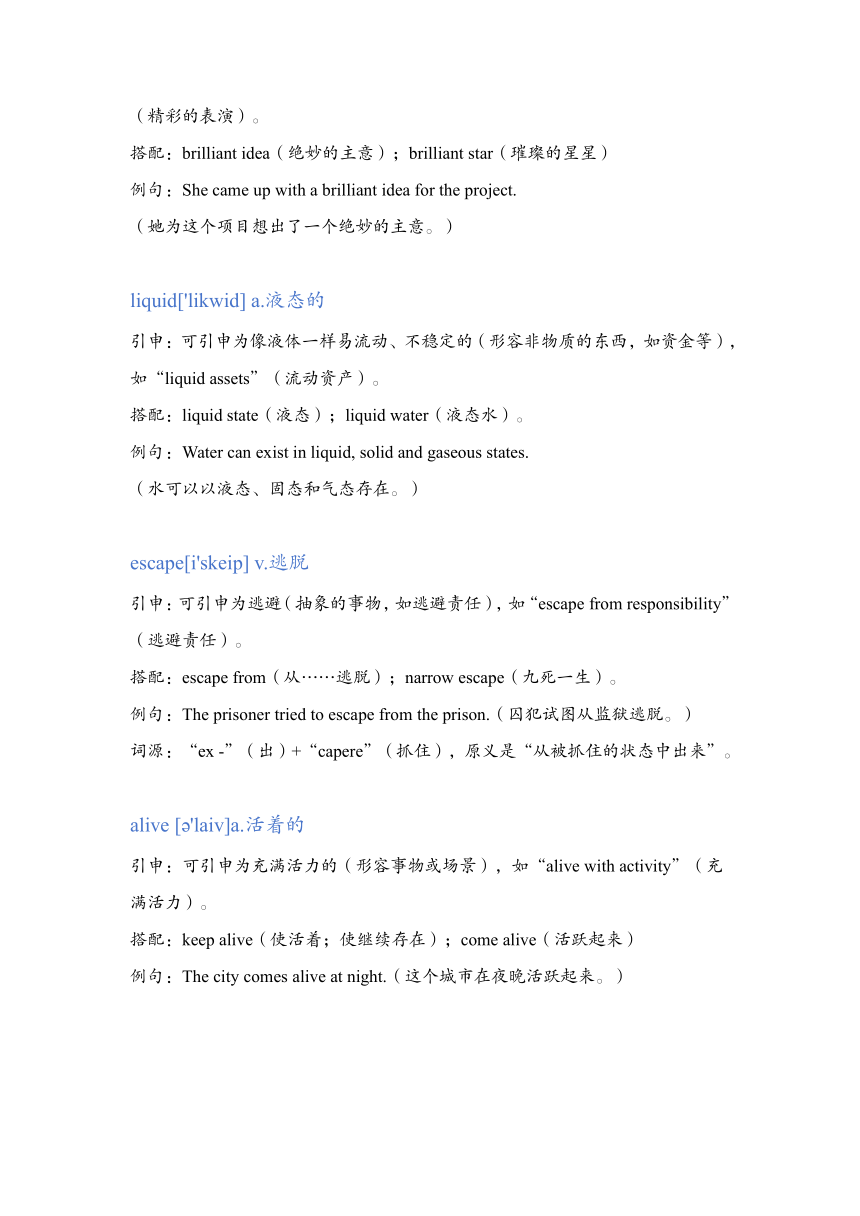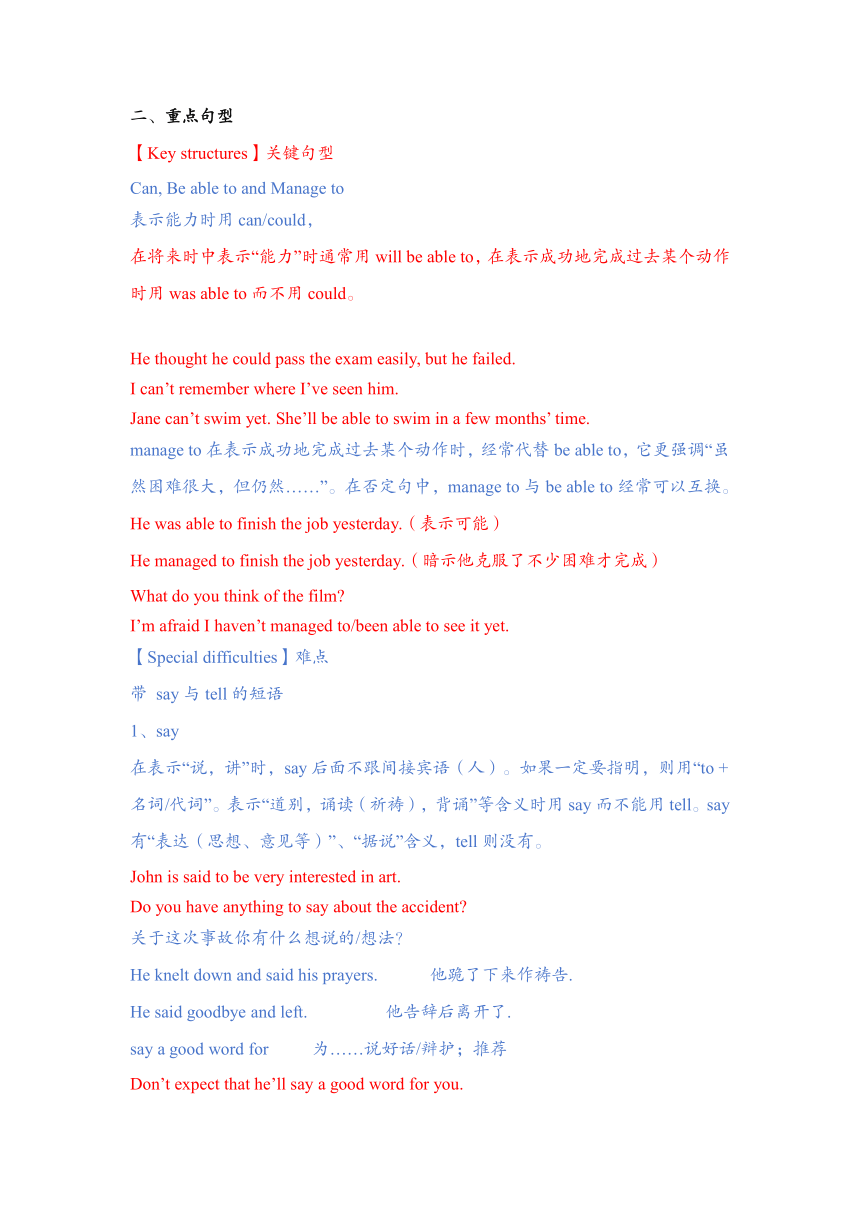新概念第二册Lesson 67 Volcanoes讲义
文档属性
| 名称 | 新概念第二册Lesson 67 Volcanoes讲义 |  | |
| 格式 | docx | ||
| 文件大小 | 128.6KB | ||
| 资源类型 | 教案 | ||
| 版本资源 | 新概念英语 | ||
| 科目 | 英语 | ||
| 更新时间 | 2024-11-24 20:12:32 | ||
图片预览




文档简介
新概念第二册
Lesson 67 Volcanoes
单词精讲
volcano [v l'kein u] n.火山
引申:可引申为像火山一样危险、充满爆发力的事物或情况,如“a volcano of anger”(愤怒的爆发)。
搭配:active volcano(活火山);dormant volcano(休眠火山);extinct volcano(死火山)。
例句:Mount Fuji is an active volcano in Japan.(富士山是日本的一座活火山。)
active[' ktiv] a.活动的
引申:可引申为积极参与的,如“active member”(积极的成员)。
搭配:active role(积极的角色);active in(在……方面活跃)。
例句:He is very active in community activities.(他在社区活动中非常活跃。)
Kivun. 基伍湖
引申:可引申为与基伍湖相关的地理、生态等概念,如“Kivu region”(基伍湖地区)。
搭配:Kivu Lake(基伍湖);around Kivu(基伍湖周边)。
例句:There are many unique species in Kivu Lake.(基伍湖中有许多独特的物种。)
Congo ['k gou]n.(the~)刚果
引申:可引申为与刚果相关的文化、社会等方面的事物,如“Congo music”(刚果音乐)。
搭配:Congo River(刚果河);the Congo Basin(刚果盆地)
例句:The Congo River is one of the major rivers in Africa.(刚果河是非洲的主要河流之一。)
Kituro n.基图罗
引申:可引申为与基图罗相关的地理特征或者当地的情况,如“Kituro area”(基图罗地区)。
搭配:near Kituro(在基图罗附近);Kituro volcano(基图罗火山)。
例句:The Kituro volcano is famous for its eruptions.(基图罗火山因其喷发而闻名。)
erupt [i'r pt]v.(火山)喷发
引申:可引申为突然爆发(除火山喷发之外的情况,如情绪爆发),如“erupt with anger”(勃然大怒)。
搭配:erupt into(突然爆发成……);volcano erupt(火山喷发)。
例句:The volcano erupted suddenly last night.(火山昨晚突然喷发了。)
词源:由“e -”(出)+“rumpere”(打破)组成,意思是“爆发出来”。
violently['vai l ntli] ad.猛烈地,剧烈地
引申:可引申为程度非常强烈地(形容非暴力的情况,如变化剧烈),如“change violently”(剧烈变化)。
搭配:shake violently(剧烈摇晃);react violently(强烈反应)。
例句:The building shook violently during the earthquake.(地震时大楼剧烈摇晃。)
manage['m nid ] v.设法
引申:可引申为成功做到(在困难情况下),如“manage to survive”(设法生存下来)。
搭配:manage with(用……设法对付);manage to do sth.(设法做某事)
例句:He managed to finish the work on time.(他设法按时完成了工作。)
brilliant['brili nt] a.精彩的
引申:可引申为非常出色、卓越的(形容人或事物的表现),如“brilliant performance”(精彩的表演)。
搭配:brilliant idea(绝妙的主意);brilliant star(璀璨的星星)
例句:She came up with a brilliant idea for the project.
(她为这个项目想出了一个绝妙的主意。)
liquid['likwid] a.液态的
引申:可引申为像液体一样易流动、不稳定的(形容非物质的东西,如资金等),如“liquid assets”(流动资产)。
搭配:liquid state(液态);liquid water(液态水)。
例句:Water can exist in liquid, solid and gaseous states.
(水可以以液态、固态和气态存在。)
escape[i'skeip] v.逃脱
引申:可引申为逃避(抽象的事物,如逃避责任),如“escape from responsibility”(逃避责任)。
搭配:escape from(从……逃脱);narrow escape(九死一生)。
例句:The prisoner tried to escape from the prison.(囚犯试图从监狱逃脱。)
词源:“ex -”(出)+“capere”(抓住),原义是“从被抓住的状态中出来”。
alive [ 'laiv]a.活着的
引申:可引申为充满活力的(形容事物或场景),如“alive with activity”(充满活力)。
搭配:keep alive(使活着;使继续存在);come alive(活跃起来)
例句:The city comes alive at night.(这个城市在夜晚活跃起来。)
重点句型
【Key structures】关键句型
Can, Be able to and Manage to
表示能力时用can/could,
在将来时中表示“能力”时通常用will be able to,在表示成功地完成过去某个动作时用was able to而不用could。
He thought he could pass the exam easily, but he failed.
I can’t remember where I’ve seen him.
Jane can’t swim yet. She’ll be able to swim in a few months’ time.
manage to在表示成功地完成过去某个动作时,经常代替be able to,它更强调“虽然困难很大,但仍然……”。在否定句中,manage to与be able to经常可以互换。
He was able to finish the job yesterday.(表示可能)
He managed to finish the job yesterday.(暗示他克服了不少困难才完成)
What do you think of the film
I’m afraid I haven’t managed to/been able to see it yet.
【Special difficulties】难点
带 say与tell的短语
1、say
在表示“说,讲”时,say后面不跟间接宾语(人)。如果一定要指明,则用“to +名词/代词”。表示“道别,诵读(祈祷),背诵”等含义时用say而不能用tell。say有“表达(思想、意见等)”、“据说”含义,tell则没有。
John is said to be very interested in art.
Do you have anything to say about the accident
关于这次事故你有什么想说的/想法?
He knelt down and said his prayers. 他跪了下来作祷告.
He said goodbye and left. 他告辞后离开了.
say a good word for 为……说好话/辩护;推荐
Don’t expect that he’ll say a good word for you.
2、tell
在表示“说,讲”时,tell后面可以跟双宾语。tell经常用于表示“讲(实话,谎话,秘密等)”。tell可以表示“辨别,分辨”,say则不可以。在英国英语中,tell the time(美语为tell time)表示根据钟表等“说出时间,识钟”
Can you tell me anything about it 你能告诉我有关的任何事情吗
He is only five, but he can already tell the time.
tell (sb.) a lie 说谎(谎言有很多个,为可数名词)
He often tells lies. 他经常说谎.
tell (sb.) the truth 讲真话(真话只有一个,故要特指, 加the)
I want you to tell me the truth. 我要你讲真话.
tell (sb.) the difference between 区分, 区别
Can't you tell the difference between an Austin and a Morris
你能区分奥斯丁舞和莫利斯舞吗
say和tell后面跟so时含义不一样:
I told you so! 我告诉过你是这样的!(用于情况被证实之后)
Who says so 谁这么说的?
I say so. 我这么说的。
课文精讲
Haroun Tazieff, the Polish scientist, has spent his lifetime studying active volcanoes and deep caves in all parts of the world.
波兰科学家哈罗恩·塔捷耶夫花了毕生的精力来研究世界各地的活火山和深洞。
spend some time (in) doing sth. 花多少时间干……
lifetime n. 毕生精力
spend most of his lifetime 花了毕生大部分精力
spend his lifetime 花了毕生精力
in all parts of the world 世界各地的
In 1948, he went to Lake Kivu in the Congo to observe a new volcano which he later named Kituro.”
1948年他去了刚果的基伍湖, 对一座后来被他命名为基图罗的新火山进行观察。
“In 1948”:在1948年,是时间状语。
“went to”:去,“go”的过去式,表示前往某个地方。
“Lake Kivu”:基伍湖,专有名词。
“the Congo”:刚果,专有名词。
“to observe”:不定式,表示目的,观察。
“a new volcano”:一座新火山。
“which he later named Kituro”:这是一个定语从句,“which”指代先行词“a new volcano”,“named”是命名的意思。
Tazieff was able to set up his camp very close to the volcano while it was erupting violently.
当火山正在猛烈地喷发时, 塔捷耶夫有办法把帐篷搭在离它非常近的地方。
was able to:能够,相当于“could”,表示有能力做某事。
set up:建立、搭建,在这里指搭建营地。
while:当……的时候,引导时间状语从句。
close to 离……很近,与……靠近
He parked the car close to the river.
Don’t sit so close to the fire.
for long=for a long time
Though he managed to take a number of brilliant photographs, he could not stay near the volcano for very long.”
当火山正在猛烈地喷发时, 塔捷耶夫有办法把帐篷搭在离它非常近的地方。
“Though”:虽然,引导让步状语从句。
“managed to take”:设法拍摄,“manage to do sth.”表示设法做成某事。
“a number of”:许多。
“brilliant photographs”:精彩的照片,“brilliant”表示精彩的、出色的。
“could not”:不能,是“can not”的过去式。
“stay near”:呆在附近。
“for very long”:很长时间。
He noticed that a river of liquid rock was coming towards him.
当火山正在猛烈地喷发时, 塔捷耶夫有办法把帐篷搭在离它非常近的地方。
=He notice a river of liquid rock coming towards him.
notice that + 宾语从句
notice sth.
notice sb. do/doing sth. 注意到某人做某事/正在做某事
a river of… ……形成的河流
a river of soil and stone 泥石流
Rivers of blood flowed during World war II. (rivers of blood 血流成河)
When she heard the news, a river of tears came down her face.
It threatened to surround him completely, but Tazieff managed to escape just in time.
他发现有一股岩浆正向他流过来, 眼看就要将他团团围住, 但塔捷耶夫还是设法及时逃离了。
threaten to 威胁着要……,有迹象表明……
He threatened to leave the team. 他扬言要离开这个队。
in time 及时,来得及,just表示“正好,差一点”
I caught the train just in time.
Shall we still be in time for/to see the performance
surround him completely:完全包围他,surround是包围的意思。
managed to escape:设法逃脱,manage to do sth.表示设法做成某事。
He waited until the volcano became quiet and he was able to return two days later.”
waited:等待,“wait”的过去式。
until:直到,引导时间状语从句。
became quiet:变得安静,“become”的过去式是“became”,这里表示火山不再喷发,变得平静。
was able to return:能够返回,“be able to”表示有能力做某事。
two days later:两天后。
This time, he managed to climb into the mouth of Kituro so that he could take photographs and measure temperatures.
他等到火山平静下来, 两天以后又返回去。这次他设法爬进了基图罗火山口, 以便能拍摄照片和测试温度。
manage to do sth. 设法做到某事,努力完成某事(虽然很费劲,但仍然做到/完成某事)
try to do sth. 设法做某事,努力做某事(但并不一定成功)
the mouth of Kituro 火山口
so that 以便于(目的状语从句),一定含有情态动词
Tazieff has often risked his life in this way.
塔捷耶夫经常冒这样的生命危险。
risk one’s life 冒着生命危险
take a risk of… =at a risk of… 冒着……的危险
risk sth.=risk losing sth. 冒着失去……的危险
risk doing sth. 冒着做……的危险
He has been able to tell us more about active volcanoes than any man alive.
他能告诉我们的有关活火山的情况比任何在世的人都要多。
在两相比较中, 如果前者属于后者, 那一定要在比较时用other, else排除前者
than any other man alive
has been able to:已经能够,是现在完成时态的“be able to”结构。
tell us more about:告诉我们更多关于……的事情。
any man alive:任何活着的人。
Lesson 67 Volcanoes
单词精讲
volcano [v l'kein u] n.火山
引申:可引申为像火山一样危险、充满爆发力的事物或情况,如“a volcano of anger”(愤怒的爆发)。
搭配:active volcano(活火山);dormant volcano(休眠火山);extinct volcano(死火山)。
例句:Mount Fuji is an active volcano in Japan.(富士山是日本的一座活火山。)
active[' ktiv] a.活动的
引申:可引申为积极参与的,如“active member”(积极的成员)。
搭配:active role(积极的角色);active in(在……方面活跃)。
例句:He is very active in community activities.(他在社区活动中非常活跃。)
Kivun. 基伍湖
引申:可引申为与基伍湖相关的地理、生态等概念,如“Kivu region”(基伍湖地区)。
搭配:Kivu Lake(基伍湖);around Kivu(基伍湖周边)。
例句:There are many unique species in Kivu Lake.(基伍湖中有许多独特的物种。)
Congo ['k gou]n.(the~)刚果
引申:可引申为与刚果相关的文化、社会等方面的事物,如“Congo music”(刚果音乐)。
搭配:Congo River(刚果河);the Congo Basin(刚果盆地)
例句:The Congo River is one of the major rivers in Africa.(刚果河是非洲的主要河流之一。)
Kituro n.基图罗
引申:可引申为与基图罗相关的地理特征或者当地的情况,如“Kituro area”(基图罗地区)。
搭配:near Kituro(在基图罗附近);Kituro volcano(基图罗火山)。
例句:The Kituro volcano is famous for its eruptions.(基图罗火山因其喷发而闻名。)
erupt [i'r pt]v.(火山)喷发
引申:可引申为突然爆发(除火山喷发之外的情况,如情绪爆发),如“erupt with anger”(勃然大怒)。
搭配:erupt into(突然爆发成……);volcano erupt(火山喷发)。
例句:The volcano erupted suddenly last night.(火山昨晚突然喷发了。)
词源:由“e -”(出)+“rumpere”(打破)组成,意思是“爆发出来”。
violently['vai l ntli] ad.猛烈地,剧烈地
引申:可引申为程度非常强烈地(形容非暴力的情况,如变化剧烈),如“change violently”(剧烈变化)。
搭配:shake violently(剧烈摇晃);react violently(强烈反应)。
例句:The building shook violently during the earthquake.(地震时大楼剧烈摇晃。)
manage['m nid ] v.设法
引申:可引申为成功做到(在困难情况下),如“manage to survive”(设法生存下来)。
搭配:manage with(用……设法对付);manage to do sth.(设法做某事)
例句:He managed to finish the work on time.(他设法按时完成了工作。)
brilliant['brili nt] a.精彩的
引申:可引申为非常出色、卓越的(形容人或事物的表现),如“brilliant performance”(精彩的表演)。
搭配:brilliant idea(绝妙的主意);brilliant star(璀璨的星星)
例句:She came up with a brilliant idea for the project.
(她为这个项目想出了一个绝妙的主意。)
liquid['likwid] a.液态的
引申:可引申为像液体一样易流动、不稳定的(形容非物质的东西,如资金等),如“liquid assets”(流动资产)。
搭配:liquid state(液态);liquid water(液态水)。
例句:Water can exist in liquid, solid and gaseous states.
(水可以以液态、固态和气态存在。)
escape[i'skeip] v.逃脱
引申:可引申为逃避(抽象的事物,如逃避责任),如“escape from responsibility”(逃避责任)。
搭配:escape from(从……逃脱);narrow escape(九死一生)。
例句:The prisoner tried to escape from the prison.(囚犯试图从监狱逃脱。)
词源:“ex -”(出)+“capere”(抓住),原义是“从被抓住的状态中出来”。
alive [ 'laiv]a.活着的
引申:可引申为充满活力的(形容事物或场景),如“alive with activity”(充满活力)。
搭配:keep alive(使活着;使继续存在);come alive(活跃起来)
例句:The city comes alive at night.(这个城市在夜晚活跃起来。)
重点句型
【Key structures】关键句型
Can, Be able to and Manage to
表示能力时用can/could,
在将来时中表示“能力”时通常用will be able to,在表示成功地完成过去某个动作时用was able to而不用could。
He thought he could pass the exam easily, but he failed.
I can’t remember where I’ve seen him.
Jane can’t swim yet. She’ll be able to swim in a few months’ time.
manage to在表示成功地完成过去某个动作时,经常代替be able to,它更强调“虽然困难很大,但仍然……”。在否定句中,manage to与be able to经常可以互换。
He was able to finish the job yesterday.(表示可能)
He managed to finish the job yesterday.(暗示他克服了不少困难才完成)
What do you think of the film
I’m afraid I haven’t managed to/been able to see it yet.
【Special difficulties】难点
带 say与tell的短语
1、say
在表示“说,讲”时,say后面不跟间接宾语(人)。如果一定要指明,则用“to +名词/代词”。表示“道别,诵读(祈祷),背诵”等含义时用say而不能用tell。say有“表达(思想、意见等)”、“据说”含义,tell则没有。
John is said to be very interested in art.
Do you have anything to say about the accident
关于这次事故你有什么想说的/想法?
He knelt down and said his prayers. 他跪了下来作祷告.
He said goodbye and left. 他告辞后离开了.
say a good word for 为……说好话/辩护;推荐
Don’t expect that he’ll say a good word for you.
2、tell
在表示“说,讲”时,tell后面可以跟双宾语。tell经常用于表示“讲(实话,谎话,秘密等)”。tell可以表示“辨别,分辨”,say则不可以。在英国英语中,tell the time(美语为tell time)表示根据钟表等“说出时间,识钟”
Can you tell me anything about it 你能告诉我有关的任何事情吗
He is only five, but he can already tell the time.
tell (sb.) a lie 说谎(谎言有很多个,为可数名词)
He often tells lies. 他经常说谎.
tell (sb.) the truth 讲真话(真话只有一个,故要特指, 加the)
I want you to tell me the truth. 我要你讲真话.
tell (sb.) the difference between 区分, 区别
Can't you tell the difference between an Austin and a Morris
你能区分奥斯丁舞和莫利斯舞吗
say和tell后面跟so时含义不一样:
I told you so! 我告诉过你是这样的!(用于情况被证实之后)
Who says so 谁这么说的?
I say so. 我这么说的。
课文精讲
Haroun Tazieff, the Polish scientist, has spent his lifetime studying active volcanoes and deep caves in all parts of the world.
波兰科学家哈罗恩·塔捷耶夫花了毕生的精力来研究世界各地的活火山和深洞。
spend some time (in) doing sth. 花多少时间干……
lifetime n. 毕生精力
spend most of his lifetime 花了毕生大部分精力
spend his lifetime 花了毕生精力
in all parts of the world 世界各地的
In 1948, he went to Lake Kivu in the Congo to observe a new volcano which he later named Kituro.”
1948年他去了刚果的基伍湖, 对一座后来被他命名为基图罗的新火山进行观察。
“In 1948”:在1948年,是时间状语。
“went to”:去,“go”的过去式,表示前往某个地方。
“Lake Kivu”:基伍湖,专有名词。
“the Congo”:刚果,专有名词。
“to observe”:不定式,表示目的,观察。
“a new volcano”:一座新火山。
“which he later named Kituro”:这是一个定语从句,“which”指代先行词“a new volcano”,“named”是命名的意思。
Tazieff was able to set up his camp very close to the volcano while it was erupting violently.
当火山正在猛烈地喷发时, 塔捷耶夫有办法把帐篷搭在离它非常近的地方。
was able to:能够,相当于“could”,表示有能力做某事。
set up:建立、搭建,在这里指搭建营地。
while:当……的时候,引导时间状语从句。
close to 离……很近,与……靠近
He parked the car close to the river.
Don’t sit so close to the fire.
for long=for a long time
Though he managed to take a number of brilliant photographs, he could not stay near the volcano for very long.”
当火山正在猛烈地喷发时, 塔捷耶夫有办法把帐篷搭在离它非常近的地方。
“Though”:虽然,引导让步状语从句。
“managed to take”:设法拍摄,“manage to do sth.”表示设法做成某事。
“a number of”:许多。
“brilliant photographs”:精彩的照片,“brilliant”表示精彩的、出色的。
“could not”:不能,是“can not”的过去式。
“stay near”:呆在附近。
“for very long”:很长时间。
He noticed that a river of liquid rock was coming towards him.
当火山正在猛烈地喷发时, 塔捷耶夫有办法把帐篷搭在离它非常近的地方。
=He notice a river of liquid rock coming towards him.
notice that + 宾语从句
notice sth.
notice sb. do/doing sth. 注意到某人做某事/正在做某事
a river of… ……形成的河流
a river of soil and stone 泥石流
Rivers of blood flowed during World war II. (rivers of blood 血流成河)
When she heard the news, a river of tears came down her face.
It threatened to surround him completely, but Tazieff managed to escape just in time.
他发现有一股岩浆正向他流过来, 眼看就要将他团团围住, 但塔捷耶夫还是设法及时逃离了。
threaten to 威胁着要……,有迹象表明……
He threatened to leave the team. 他扬言要离开这个队。
in time 及时,来得及,just表示“正好,差一点”
I caught the train just in time.
Shall we still be in time for/to see the performance
surround him completely:完全包围他,surround是包围的意思。
managed to escape:设法逃脱,manage to do sth.表示设法做成某事。
He waited until the volcano became quiet and he was able to return two days later.”
waited:等待,“wait”的过去式。
until:直到,引导时间状语从句。
became quiet:变得安静,“become”的过去式是“became”,这里表示火山不再喷发,变得平静。
was able to return:能够返回,“be able to”表示有能力做某事。
two days later:两天后。
This time, he managed to climb into the mouth of Kituro so that he could take photographs and measure temperatures.
他等到火山平静下来, 两天以后又返回去。这次他设法爬进了基图罗火山口, 以便能拍摄照片和测试温度。
manage to do sth. 设法做到某事,努力完成某事(虽然很费劲,但仍然做到/完成某事)
try to do sth. 设法做某事,努力做某事(但并不一定成功)
the mouth of Kituro 火山口
so that 以便于(目的状语从句),一定含有情态动词
Tazieff has often risked his life in this way.
塔捷耶夫经常冒这样的生命危险。
risk one’s life 冒着生命危险
take a risk of… =at a risk of… 冒着……的危险
risk sth.=risk losing sth. 冒着失去……的危险
risk doing sth. 冒着做……的危险
He has been able to tell us more about active volcanoes than any man alive.
他能告诉我们的有关活火山的情况比任何在世的人都要多。
在两相比较中, 如果前者属于后者, 那一定要在比较时用other, else排除前者
than any other man alive
has been able to:已经能够,是现在完成时态的“be able to”结构。
tell us more about:告诉我们更多关于……的事情。
any man alive:任何活着的人。
同课章节目录
